

|
(In order of preference) |
 Kundun (Touchstone Pictures)
Kundun (Touchstone Pictures)In this unconvential Dalai Lama biopic, Martin Scorsese at last captures the radiant gravity that eluded his The Last Temptation of Christ 10 years ago. Less a costume drama than a cinematic tone poem, Kundun eschews the standard history lessons. Instead, it evokes a deep-seated beauty through its images, sounds, and rhythms -- all resonating in an utterly symphonic conclusion. In terms of pure cinema, this is truly exciting stuff. |
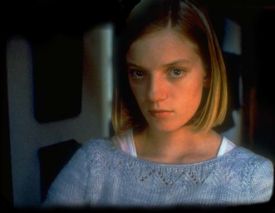 The Sweet Hereafter
The Sweet Hereafter(Fine Line Features) Atom Egoyan does Russell Banks, superimposing the essentials of Banks' novel about the aftermath of a school bus accident on his own concerns about the needs of the individual and the nature of family and community. A la Exotica, the narrative flits forward and backward in time, revealing different perspectives on the tragedy in their own good time. At its most affecting moments, it's otherwordly. One of the best ensemble casts of the year (see also L.A. Confidential, below) is topped out by the astonishing Ian Holm, with Sarah Polley and Bruce Greenwood making big impressions. |
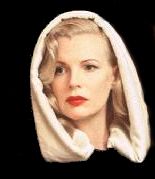 L.A. Confidential
L.A. Confidential (Fox Searchlight) Perhaps the single best time that could be had in a movie theater this year. L.A. Confidential is an absolute pleasure to watch, no less so for the acuity with which Brian Helgeland's screenplay boils down James Ellroy's sprawling hard-boiled novel. Much credit is due to solid performances all around, as well as what must have been preternaturally focused direction by Curtis Hanson, who showed some stuff unseen in his previous features. Not at all flashy, but gripping and thematically solid in a way few contemporary features ever manage. |
Saying that David Cronenberg's Crash is not to everyone's taste is probably an understatement. Many critics found it overblown and half-baked, but I'm not one of them. Rather, I found it to be the most intriguing addition to the Cronenberg canon since 1987's singularly disturbing Dead Ringers -- a compelling vision of a sort of psychosexual apocalypse. It's pretty funny, too, for a psychosexual apocalypse flick. Standouts are the scene where a bunch of Cronenbergian weirdos treat a Swedish crash test videotape like porno, and the one that makes an automatic car wash look like, well, a perfectly natural place to have sex. |
 Conspirators of Pleasure
Conspirators of Pleasure (Zeitgeist) Another one of the stranger films of 1997 was this newest macabre gem from master Czech animator Jan Svankmajer, depicting a bunch of hardcore sexual fetishists with rather odd fixations whose quests for fulfillment lead them down intersecting paths. It's hard to tell what, if anything, this film really "means." But it bears the fingerprints of a visionary, and it's a surrealist's delight. |
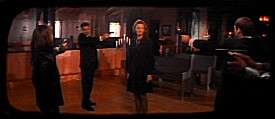 Face/Off (Paramount)
Face/Off (Paramount) After a couple of interesting failures (Hard Target, Broken Arrow), Hong Kong expatriate John Woo finally puts the big Hollywood machine to work making a John Woo movie, with a couple of American superstars who are almost as cool as his former leading man, Hong Kong's Chow Yun-Fat. Nicolas Cage does stand-out work, not so much in his continuing role as president of the Psycho of the Month Club, but rather after he changes faces with Travolta -- he plays the straight-arrow agent as a befuddled, nearly broken man. Combine the virtuoso performances with the ferociously violent set pieces and you've got an operatic action flick of the highest order. |
 Fast, Cheap & Out of Control
Fast, Cheap & Out of Control (Sony Pictures Classics) Errol Morris's documentary about a circus trainer, a topiary gardener, a robot scientist, and a mole rat expert was one of 1997's simplest pleasures. With what seems like effortless aplomb, Morris edits interview footage together with his trademark hyperreal staged scenes to create a connect-the-dots portrait of the human race at the end of the 20th century. He also manages to pay tribute to the satisfaction of a job well done. |
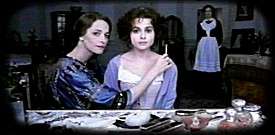 The Wings of the Dove
The Wings of the Dove (Miramax) Director Iain Softley's breakthrough is an expertly engaging distillation of Henry James that turns on Helena Bonham Carter's performance as a turn-of-the-century woman whose turn-of-the-century unhappiness may or may not excuse her deviousness. Photographed in rhyming tones of purples and blues, she is the cunning but rueful apex of the year's most disquieting lovers' triangle. |
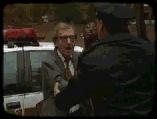 Deconstructing Harry
Deconstructing Harry (Fine Line Features) This is the year's guiltiest pleasure -- a Woody Allen film that hangs Woody Allen out to dry and then has the gall to stump for our sympathy in the last reel. The director claims that there's nothing particularly autobiographical about this picture, but it has the ring of truth. And that's why it's so bitterly, pungently funny. Did I laugh? I laughed long and loud. It's recommended only to Woody's legion of devoted fans, but I'd be disingenuous if I tried to deny that this, his most self-indulgent comedy in years (and that's saying a lot), won me over completely. |
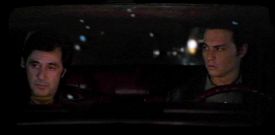 Donnie Brasco
Donnie Brasco (Columbia) Anchored by knockout performances, Donnie Brasco manages to retool the gangster movie, with a narrowed focus and only a couple of nods to Scorsese. What feels just right is the menace, the sense of dread that accompanies a small-timer's life in the mob -- not to mention an undercover cop's. Based on a true story, natch, but Paul Attanasio's screenplay finds the proper place for every character and each sticky situation. |
|
Most Underrated
Most Overrated
Best Reissue (Theatrical)
Best Video Release If Celine and Julie Go Boating isn't a revolutionary film, it's a uniquely captivating one. The opening scenes, in which Celine, sitting on a park bench, sees Julie rush by, dropping her scarf, and then chases after her with it, give you no clue by themselves what the film's subject is likely to be. It's only later on, when things start to become a little bit baffling, that you realize that Celine is Julie's White Rabbit, and that both of them have no gone through the looking glass -- or the viewfinder, as it were.
Celine and Julie become spectators, and eventually participants, in a delightful sort of dream-theater version of cinema. As an audience, they have the opportunity to make a moral choice regarding what happens on-screen and their culpability in those events. At first, the situation is simply baffling. Before the film is over, it will become wholly satisfying, and then baffling again.
But it's a fascinating game given elegant form through Rivette's leisurely, elliptical style (at 193 minutes, it's even more expansive, in its own way, than Titanic). More, it's a compelling exercise in spectatorship, paying tribute to the way that we watch movies. It may also seem like a bit of a relic, since they don't make art movies like this anymore. All the more reason to set aside a Sunday afternoon and enjoy.
Runners-Up:
Best Reason to Pay For Cable
Best Book on Film
Best Reason to Log On Every Day
The "Miramarketing" Award for Most Egregious Misrepresentation of a Film
The "My Brain Is My Second Favorite Organ" Award
The "Everyone's A Critic" Award for Best Off-the-Cuff Slam
Best Dumb Fun |
